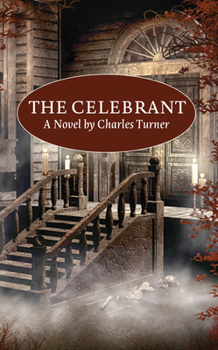The Celebrant
In the summer of 1878 Memphis was a city of death. Yellow fever was devastating the city, driving thousands of panic-stricken inhabitants in the countryside, or up North by Mississippi steamboat. At most ports the overcrowded steamers were met by mobs armed with clubs and shotguns. They were forced to continue up and down the river, looking for a landing that wouldn't drive them away. There wasn't much hope of the fever letting up until the first frost. No one knew what caused it, and no one knew how to stop it. Every hour brought the thunderous clap of a canon--a desperate attempt on the part of some local "expert" to dispel the poisonous spores of the disease. Death stalked those who remained in Memphis. By midsummer, seventy corpses a day were being rushed by wagon to the city's outskirts for a hasty burial. Louis Schuyler, a young Episcopal priest, believed that God wanted him to leave his church in New Jersey and minister to the sick, dying, and terrified residents of this subtropical hell. THE CELEBRANT, a historical novel, is the story of Louis' response to God's call and his struggles with its fearful implications. Did God really call him to Memphis? Louis himself grappled with doubts Wasn't Wasn't there spiritual pride in Louis' determination to risk his life? And what could a young clergyman, a lover of books, music, and liturgy, do in a city that cried out for doctors and nurses? How indeed could Louis, a Christian, understand the horror that assaulted his mind and sense on the streets of Memphis? "Could faith itself fall victim?" Louis wondered
Format:Hardcover
Language:English
ISBN:1725257084
ISBN13:9781725257085
Release Date:May 2020
Publisher:Wipf & Stock Publishers
Length:152 Pages
Weight:0.62 lbs.
Dimensions:0.4" x 5.0" x 8.0"
Customer Reviews
1 rating
Slightly outdated, but still a great book
Published by Thriftbooks.com User , 16 years ago
James Hitchcock has been described as "probably the most prolific (and easily the most articulate) critic of theological liberalism in the American church" (Michael Cuneo, in The Smoke of Satan) in the years since Vatican 2, and this book is a great example of that articulate and powerful voice at work. Published in 1979, it is obvious that at one level it is out of date, since in the last thirty years many things have happened in the American Catholic church, and, though Hitchcock makes some attempts at predictions in the book, not all of them came to fruition--which for the most part is a good thing, given some of his gloomy scenarios. What Hitchcock did not foresee--and that turned out to be a good thing--was the vitality that the pontificate of John Paul 2 would bring to the Church in the ensuing years after Hitchcock's book was published. Not to mention the insight and energy of Evangelical converts to the Church like Scott Hahn, Fr. Richard Neuhaus, and Francis Beckwith (among others). "Catholicism and Modernity" stands out in two significant ways to this reader: one is the litany of examples that he draws from to prove his case that many of the clergy and religious in the Church had succumbed in numerous ways to the modernity of the culture at large. These examples (drawn often from the National Catholic Reporter) show a wholesale rejection of the Magisterium of the Church, a rejection apparently predicated on the mistaken notion that soon, the Pope and all his bishops would also, in a moment of "enlightenment" overturn centuries of Church teaching in favor of theological modernism. Hitchcock shows how this worked through the bureacracy of the church as well as by catering to the media--and the media is taken to task as much as is the bureacracy. The other aspect about the book that stands out is its theoretical framework. Here Hitchcock draws on several notable books to make his case--"The Triumph of the Therapeutic" by Philip Rieff and "The Cultural Contradictions of Capitalism" by Daniel Bell. I don't know if either of those writers are Christians, but they are certainly put to good use by Hitchcock--Rieff in particular. Hitchcock quotes Rieff ("Religious man was born to be saved; psychological man was born to be pleased") and then goes on that "many Catholics have adopted the therapeutic mentality without even realizing it" and that its spread "is at the root of most other problems." These problems are brought into the Church through the "residual hold" the church has on people, and in the way they "demand that the Church give its blessing to their transgressions." Later chapters in the book take the personal into the political--there is a lengthy explication about the rather glaring preference that numerous left-wing Catholics had (and sometimes continue to have) for various totalitarian regimes of the 1970's, and this includes the huge impact that the Vietnam war had on these leftists as well. Here Hitchcock points out





